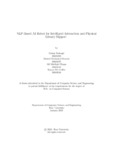| dc.contributor.advisor | Rahman, Md. Khalilur | |
| dc.contributor.author | Dastagir, Golam | |
| dc.contributor.author | Hossain, Khaled Mushahed | |
| dc.contributor.author | Haque, Md Mahfujul | |
| dc.contributor.author | Gaffar, Raiyan Bin | |
| dc.date.accessioned | 2024-05-07T06:27:09Z | |
| dc.date.available | 2024-05-07T06:27:09Z | |
| dc.date.copyright | ©2024 | |
| dc.date.issued | 2024-01 | |
| dc.identifier.other | ID: 20101493 | |
| dc.identifier.other | ID: 20101297 | |
| dc.identifier.other | ID: 20101445 | |
| dc.identifier.other | ID: 20101056 | |
| dc.identifier.uri | http://hdl.handle.net/10361/22757 | |
| dc.description | This thesis is submitted in partial fulfillment of the requirements for the degree of Bachelor of Science in Computer Science and Engineering, 2024. | en_US |
| dc.description | Cataloged from PDF version of thesis. | |
| dc.description | Includes bibliographical references (pages 43-44). | |
| dc.description.abstract | The benefits and advantages of integrating AI, ML, and NLP into library services
which can redefine how traditional libraries function are thoroughly discussed in
this paper. The practical applications of ML and AI in library settings are also explored
here. With challenges like information overload, evolving user expectations,
the need for personalized experiences, and other similar issues raise the proposal
for the development of an advanced library assistant. In our study, we have gone
through different academic publications as well as examining different scenarios in
which these implications will be able to enhance library operations. Also, the introduction
of a responsive bot system in our study further extends the Library
Assistant’s capabilities, which has made it possible to bridge the divide between
physical and virtual library spaces. Our research comprehends the broad range of
redefining the role of libraries in the digital age, with the envisioning towards a dynamic
future where libraries will seamlessly blend tradition with innovation. This
paper presents an in-depth analysis regarding how the system is able to enhance
the library mechanism by providing perception into user sentiment as well as enabling
an efficient book discovery. We have provided particular consideration to
instructive case studies, project execution, and theoretical frameworks. The paper
also emphasizes the unique role that is done by the librarians, acknowledging their
ethical decision-making capabilities as well as emotional intelligence which is not
possible by any robot or assistant system. By combining all of this intensive study,
we hope to highlight the important influence that AI and NLP technologies may
have on library operations. The proper combination of AI technologies could indeed
contribute to major technical advances for libraries, putting them at the forefront
of society’s growth throughout this digital transition. | en_US |
| dc.description.statementofresponsibility | Golam Dastagir | |
| dc.description.statementofresponsibility | Khaled Mushahed Hossain | |
| dc.description.statementofresponsibility | Md Mahfujul Haque | |
| dc.description.statementofresponsibility | Raiyan Bin Gaffar | |
| dc.format.extent | 56 pages | |
| dc.language.iso | en | en_US |
| dc.publisher | Brac University | en_US |
| dc.rights | Brac University theses are protected by copyright. They may be viewed from this source for any purpose, but reproduction or distribution in any format is prohibited without written permission. | |
| dc.subject | Artificial intelligence | en_US |
| dc.subject | Machine Learning | en_US |
| dc.subject | Natural language processing | en_US |
| dc.subject.lcsh | Natural language processing (Computer science) | |
| dc.subject.lcsh | Artificial intelligence | |
| dc.title | NLP-based AI robot for intelligent interaction | en_US |
| dc.type | Thesis | en_US |
| dc.contributor.department | Department of Computer Science and Engineering, Brac University | |
| dc.description.degree | B.Sc. in Computer Science and Engineering | |

